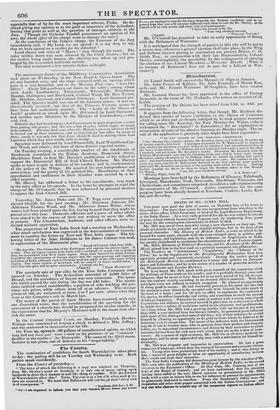The anniversary dinner of the Middlesex Conservative Association took place
on Wednesday, at the New English Opera.house. The pit was boarded over, and the stage canopied with an awning, which gave it a very beautiful, and as the Morning Post says, " tent-like effect." About 7U0 gentlemen sat down to the table ; among whom were Lords Londonderry, Teignmouth, Wharneliffe, Winchilsea, Bandon, Darlington, and Brecknock, Colonel Wood, Mr. Rice Trevor, Mr. Matthias Atwood, and Colonel Sibthorpe. Lord Stormont pre- sided. The Queen's health was one of the favourite toasts : it was en- thusiastically received ; but that of the Princess Victoria seems to have been but moderately popular. The " health of she House of Lords" produced an attack upon Mr. O'Connell by Lord Stormont ; and another upon Ministers by the Marquis of Londonderry,—who said, that, Hitherto they bad been keeping a bad Government in place to prevent a worse from getting into power ; but this was a line of policy which ought no longer to be endured. The lime had come when his Majesty's present advisers should be turned out of their situations, and as they had gut into office by means of force, surely it was only fair that force should be used to dislodge them from a position which they were wholly unfit to occupy.
Speeches were delivered by Lord Wharncliffe, Lord Winchilsea,Cap- fain Wood, and others ; but none of these deserve especial notice.
On Tuesday evening, a considerable number of the inhabitants of Southwark assembled in the Riding Academy, Brunswick Street, Blackfriars Road, to hear Mr. Harvey's justification of his refusal to support the Ministerial Bill of Irish Church Reform. Mr. Harvey spoke at some length in defence of his conduct, and in condemnation of the policy of the Whigs. He asserted his own independence and
consistency, and the purity of his political life. Resolutions of their approbation and confidence in their Member were carried by a de- cided majority.
Mr. Harvey has addressed a letter to his constituents, very much to the same effect as his speech. In the letter he attempts to repel the charge of Mr. O'Connell, that he was influenced by personal motives to oppose the Irish Church Bill.


























 Previous page
Previous page